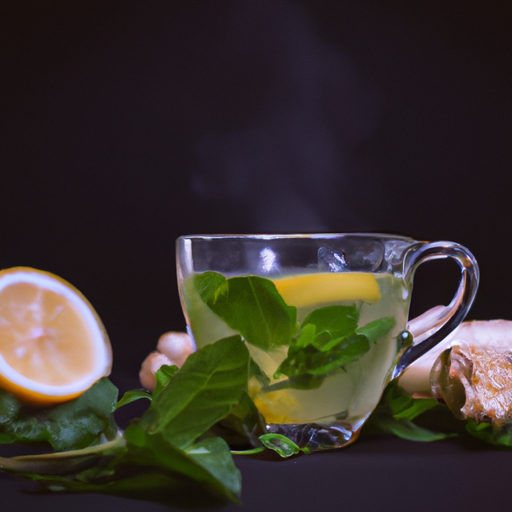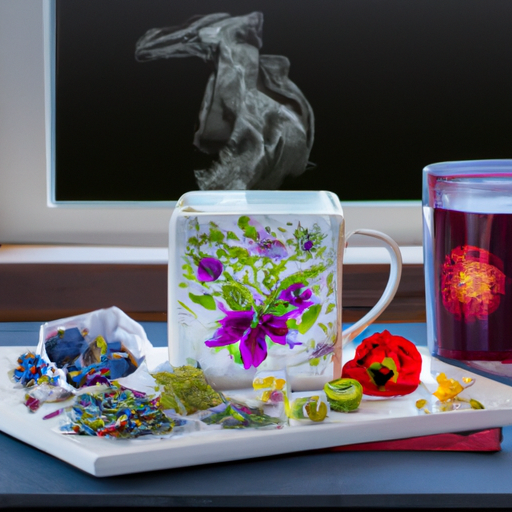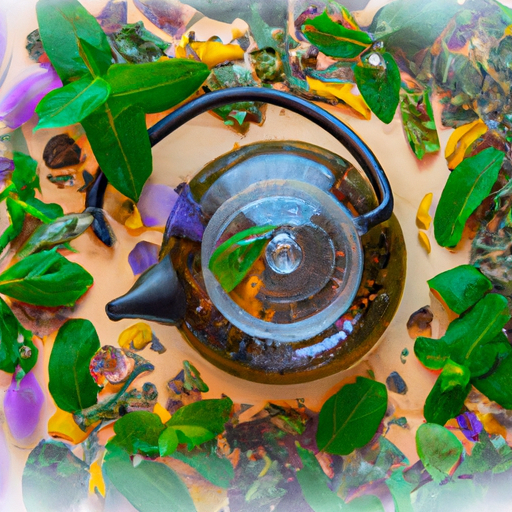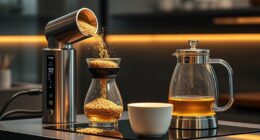It is estimated that around 20% of the population experiences acid reflux at least once a week. As someone who deals with this condition, I can confirm the discomfort and frustration it causes.
One thing that has puzzled me for quite some time is why herbal tea, which is often touted for its health benefits, seems to trigger my reflux symptoms. In this article, we will delve into the science behind acid reflux and explore the potential culprits in herbal teas that may exacerbate this condition.
We will also consider the impact of temperature and brewing time on the reflux-inducing properties of herbal teas. Additionally, we will discuss alternative options for those who want to enjoy a warm beverage without the unwanted side effects.
Finally, we will provide some helpful tips for minimizing reflux symptoms and highlight the importance of seeking professional guidance.
So, join me as we unravel the mystery of why herbal tea sets off our reflux.
Key Takeaways
- Herbal teas can trigger acid reflux symptoms due to potential allergic reactions, ingredients that relax the lower esophageal sphincter, and their impact on gut health.
- Chamomile tea can cause allergic reactions in individuals with ragweed sensitivities.
- Peppermint and spearmint in herbal teas can relax the lower esophageal sphincter, leading to acid reflux symptoms.
- Ginger tea has anti-inflammatory properties that may help reduce acid reflux symptoms.
Understanding Acid Reflux and its Triggers
If you’ve ever wondered why sipping on some herbal tea can set off your reflux, let’s dive into understanding acid reflux and its triggers!
Acid reflux, also known as gastroesophageal reflux disease (GERD), occurs when stomach acid flows back into the esophagus. This backward flow can cause a variety of symptoms, including heartburn, chest pain, and regurgitation.
There are several potential causes of acid reflux. One common trigger is the relaxation of the lower esophageal sphincter (LES), a muscle that acts as a barrier between the stomach and the esophagus. When the LES relaxes, it allows stomach acid to flow back up, leading to reflux. Other factors that can contribute to acid reflux include obesity, hiatal hernia, pregnancy, smoking, and certain medications.
To prevent acid reflux, it’s important to adopt certain lifestyle modifications. These include maintaining a healthy weight, avoiding trigger foods and beverages, eating smaller meals, and avoiding lying down immediately after eating. Additionally, avoiding tight clothing around the waist and elevating the head of the bed can also help reduce symptoms.
Now, let’s explore the potential culprits in herbal teas that could be triggering your reflux.
The Potential Culprits in Herbal Teas
The hidden suspects lurking in herbal elixirs might be to blame for triggering my acid backlash. As I delve into the world of herbal teas, I’ve come across potential culprits that can wreak havoc on my gut health. Here are three key factors to consider when it comes to herbal tea and its impact on acid reflux:
-
Potential allergic reactions: Some herbal teas contain ingredients that can trigger allergic reactions in certain individuals. For example, chamomile tea, which is often praised for its calming effects, can cause allergic reactions in people with sensitivities to ragweed. These allergic reactions can manifest as symptoms of acid reflux.
-
Herbal tea ingredients: Certain herbal tea ingredients, such as peppermint and spearmint, can relax the lower esophageal sphincter (LES), the muscle that prevents stomach acid from flowing back into the esophagus. When the LES is relaxed, it becomes easier for acid to splash up, leading to acid reflux symptoms.
-
Gut health implications: Herbal teas can also have an impact on the overall health of our gut. Some herbal teas, like ginger tea, have been shown to possess anti-inflammatory properties that may help reduce symptoms of acid reflux. On the other hand, certain teas, like licorice root tea, can increase the production of stomach acid, exacerbating acid reflux symptoms.
Understanding these potential triggers in herbal teas is crucial for managing acid reflux. Now, let’s explore the impact of temperature and brewing time on this delicate balance.
Impact of Temperature and Brewing Time
To truly unlock the full potential of your herbal elixirs, it’s crucial to understand how the temperature and brewing time can have a profound impact on the delicate balance of flavors and benefits they offer.
The effect of different tea leaves on reflux can vary greatly depending on the brewing process. When brewing herbal tea, it’s important to consider the temperature at which you steep the leaves. High temperatures can extract more of the plant’s essential oils and flavors, but they can also increase the acidity, which may trigger reflux symptoms. It is generally recommended to use water that’s around 200°F (93°C) for herbal teas, as this temperature helps to extract the desired compounds without causing excessive acidity.
Alongside temperature, the brewing time also plays a significant role in the reflux-inducing potential of herbal teas. Longer brewing times can lead to more extraction of certain compounds, such as tannins, which can contribute to acidity. It is advisable to follow the recommended brewing time for the specific type of herbal tea you’re using, as different teas require different steeping durations to achieve the desired flavor profile without exacerbating reflux.
Additionally, it’s important to consider the role of caffeine in reflux. While herbal teas are typically caffeine-free, some blends may contain small amounts of caffeine if they include ingredients like yerba mate or guayusa. Caffeine can relax the lower esophageal sphincter, allowing stomach acid to flow back into the esophagus more easily and potentially triggering reflux symptoms. Therefore, it’s advisable to opt for caffeine-free herbal teas to minimize the risk of reflux.
Understanding the impact of temperature and brewing time on reflux-causing factors in herbal teas is essential for individuals seeking alternatives to traditional tea options. By carefully controlling these variables, you can enjoy the flavors and benefits of herbal teas without exacerbating reflux symptoms.
Herbal Tea Alternatives for Acid Reflux
Looking for a flavorful and soothing option that won’t aggravate your acid reflux? Try exploring some delicious herbal tea alternatives! While herbal teas are generally considered a healthier option compared to caffeinated beverages, certain varieties can still trigger acid reflux symptoms. However, there are alternative remedies and lifestyle changes that can help minimize these symptoms.
One herbal tea alternative that’s often recommended for acid reflux sufferers is chamomile tea. Chamomile has been used for centuries to treat digestive issues and has a calming effect on the stomach. It can help reduce inflammation and soothe the lining of the esophagus, providing relief from acid reflux symptoms.
Another option to consider is ginger tea. Ginger has long been known for its digestive benefits and can help reduce the production of stomach acid. It also has anti-inflammatory properties that can help soothe an irritated esophagus.
Peppermint tea, on the other hand, should be avoided as it can relax the lower esophageal sphincter, allowing stomach acid to flow back up into the esophagus.
In addition to herbal tea alternatives, making certain lifestyle changes can also help minimize reflux symptoms. These include maintaining a healthy weight, avoiding trigger foods, eating smaller meals, and avoiding lying down immediately after eating.
Transitioning into the next section, let’s explore some tips for minimizing reflux symptoms without resorting to medication.
Tips for Minimizing Reflux Symptoms
If you’re tired of feeling like a fire-breathing dragon, here are some handy tips to soothe the flames of reflux symptoms without relying on medication.
Minimizing reflux symptoms and managing acid reflux can be challenging, but with a few lifestyle changes, you can find relief.
First and foremost, it’s essential to maintain a healthy weight. Excess weight can put pressure on your stomach, increasing the likelihood of acid reflux.
Additionally, avoid lying down or going to bed immediately after eating. Allow at least three hours for your food to digest before lying down to minimize the risk of acid reflux.
Another helpful tip is to elevate the head of your bed by using a wedge pillow or raising the head of your mattress. This elevation can prevent stomach acid from flowing back up into the esophagus.
Furthermore, certain dietary changes can make a significant difference. Limiting your intake of fatty foods, spicy foods, caffeine, and alcohol can help reduce reflux symptoms.
Lastly, it’s crucial to manage stress levels, as stress can exacerbate acid reflux.
By implementing these tips, you can effectively minimize reflux symptoms and improve your overall well-being. Seeking professional guidance can provide further insight into managing acid reflux and finding long-term solutions.
Seeking Professional Guidance
To effectively manage reflux symptoms, it is essential to seek professional guidance. While there are numerous natural remedies available, consulting with a healthcare provider ensures that you receive personalized advice based on your specific condition and needs.
Professional advice provides valuable insight into the underlying causes of your reflux and can help determine if herbal tea is exacerbating your symptoms. A healthcare provider will assess your medical history, conduct a physical examination, and may recommend additional diagnostic tests to identify any contributing factors. This comprehensive evaluation allows for a more targeted approach in managing your reflux.
In addition to identifying triggers, healthcare professionals can guide you in incorporating natural remedies into your treatment plan. They have access to evidence-based research and clinical experience to recommend the most effective remedies. It is important to note that not all natural remedies are suitable for everyone, and a healthcare provider can help you navigate through the options to find the ones that work best for you.
By seeking professional guidance, you can optimize your reflux management strategy and find relief from your symptoms. In the next section, we will discuss the conclusion and final thoughts on managing reflux effectively.
Conclusion and Final Thoughts
In conclusion, seeking professional guidance can be the key to effectively managing your reflux symptoms and finding the relief you deserve. Reflux can be a challenging condition to manage, and it’s important to consult with a healthcare professional to determine the best course of action for your specific situation. They can provide personalized advice based on your medical history and current symptoms.
When it comes to herbal tea and reflux, it’s essential to explore different options and their potential health benefits. While herbal teas are generally considered a healthier alternative to regular tea or coffee, some varieties may trigger reflux symptoms in certain individuals. For example, chamomile tea is often recommended for its calming properties, but it can also relax the lower esophageal sphincter, leading to acid reflux.
Other herbal teas like ginger, licorice, and marshmallow root have been suggested to have potential benefits for reflux sufferers. Ginger has anti-inflammatory properties that may help soothe the digestive system, while licorice and marshmallow root can provide a protective coating for the esophagus.
However, it’s important to note that the effects of herbal teas can vary from person to person, and it’s crucial to consult with a healthcare professional before incorporating them into your reflux management plan. They can provide guidance on the potential benefits and risks associated with different herbal teas, ensuring that you make informed decisions about your reflux treatment.
Frequently Asked Questions
Can herbal tea actually worsen acid reflux symptoms?
Herbal tea can worsen acid reflux symptoms due to its potential to relax the lower esophageal sphincter. However, some herbal teas, like chamomile or ginger, may have potential health benefits for digestive health and can be consumed in moderation alongside proper management techniques for acid reflux.
Are there specific herbal teas that are more likely to trigger acid reflux?
Certain herbal teas may trigger acid reflux symptoms, but it varies from person to person. Chamomile and peppermint teas, for example, are often associated with reflux. It is also important to consider other factors such as pregnancy and sleep quality when consuming herbal tea.
Does the temperature and brewing time of herbal tea affect its impact on acid reflux?
The temperature and brewing time of herbal tea can affect its impact on acid reflux. Caffeine can worsen reflux symptoms, while certain herbal tea ingredients may trigger acid reflux by relaxing the lower esophageal sphincter.
What are some alternatives to herbal tea that can be consumed without triggering acid reflux?
Some alternatives to herbal tea that can be consumed without triggering acid reflux include chamomile tea, ginger tea, and licorice tea. These natural remedies for acid reflux have been shown to soothe the digestive system.
Are there any additional tips or lifestyle changes that can help minimize acid reflux symptoms, apart from avoiding herbal tea?
To minimize acid reflux symptoms, diet changes can be helpful. For example, avoiding spicy and fatty foods can reduce symptoms. Natural remedies like ginger or chamomile tea may also provide relief.
Conclusion
In conclusion, while herbal teas are often touted for their health benefits, they can be a trigger for acid reflux in some individuals. The combination of certain herbs, such as peppermint or spearmint, along with the temperature and brewing time, can aggravate the symptoms of reflux.
It’s important to be mindful of these potential triggers and opt for herbal tea alternatives that are gentler on the digestive system. Remember, knowledge is power when it comes to managing reflux symptoms, so seek professional guidance and make informed choices for your well-being.










